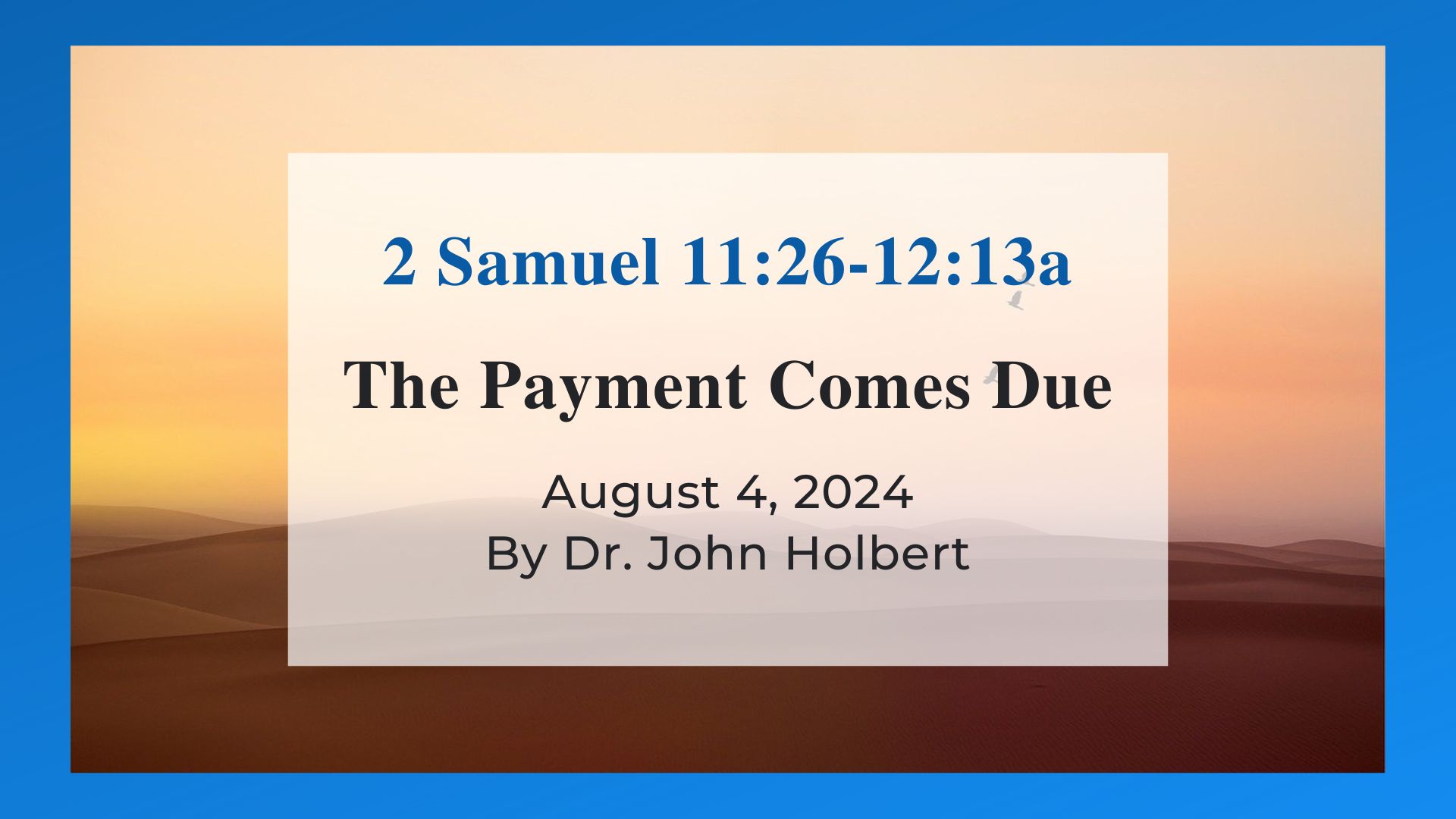The Payment Comes Due - Reflections on 2 Samuel 11:26-12:13a
by Dr. John Holbert on Monday, July 29, 2024

The Payment Comes Due
2 Samuel 11:26-12:13a
The Peripatetic Hebrew Bible Preacher
As we saw last week, King David, apparently feeling freed from all moral bounds, has shattered at least four of what we know as the Ten Commandments. This is not to say that David actually knew of the Ten, whose formulation may have been centuries after his 10th century BCE life, but it is to note that wretched human behaviors such as those exhibited by the king surely served as the reason for the commandments’ ultimate existence, both in Exodus 20 and Deuteronomy 5. David has murdered, committed adultery, lied about both acts, and has in those acts created an idol of his own power. But what happens in this passage today demonstrates one of the Bible’s crucial truths: human power and will have decided limitations in the face of the power of YHWH. It is not too much to say that in 2 Sam.12, we US Americans find nothing less than the crucial reality of a society marked by the sharp separation between church and state. Standing in the presence of God, no human can act in any way she/he desires, and no state/nation has the right to act contrary to the will and design of that God.
After Uriah’s murder at Rabbah, made possible by the command of David and the direct act of Joab, “Uriah’s wife heard that Uriah her man was dead, and she keened (i.e. “made lamentation”) over her husband. And when the mourning was over, David sent and gathered her into his house and she became his wife. And she bore him a son” (2 Sam.11:26-27). All these actions are obviously precipitous; Bathsheba laments all right—such lamentation might traditionally have been seven days—but the strong indication is that it was not one minute more than necessary for the sake of Israelite sensibility. The day the lamentation ends, David sends for her, makes her his wife, just before her belly begins noticeably to swell, and she soon bears a son. The two lovers imagine that they have pulled it off; they may now play king and queen together with their newborn heir.
“But the thing that David had done was evil in the eyes of YHWH” (2 Sam.11:27). Rarely does a Hebrew narrator break into the story’s flow with such an explicit moral judgment, but this clear and abrupt statement introduces the appearance of Nathan the prophet, who captures the king’s attention with a short parabolic tale “wherein to catch the conscience of the king,” as Shakespeare unforgettably puts in “Hamlet,” when Hamlet tries to entice his Uncle Claudius into confessing his murder of his brother, Hamlet’s father, by use of a narrative play.
The tale is justly famous. “Two men there were in a single town,” it begins, announcing its obvious folklore quality, as one finds in Job 1 or in 1 Samuel 1 at the start of the story of Hannah and Elkanah. The story is spiced with rare Hebrew words for “ewe” and “poor” and “wayfarer” and “traveler.” But finally, the narrative contrasts the two men simply as “rich” and “poor,” again and again using the Hebrew “ish” (“man”) to designate each of the story’s figures. Thus, Nathan concludes his telling with that potent phrase, known to all Bible readers, ‘atah ha’ish (“You are the man!”). David has assumed, quite naively, that the story was told by Nathan as one needing kingly adjudication; the rich man who grabbed the only lamb of the poor man to serve to his traveler should pay the theft back four-fold and is himself “doomed,” presumably a candidate for capital punishment. But the man, it turns out is the king himself.
It may be imagined that David retains at least a modicum of conscience with perhaps a desire finally to do the right thing. After all, as king his first obligation is to protect his subjects, to dispense equal justice most especially to the marginalized in the community. Ps.72 makes those requirements plain enough, and may perhaps have been recited at David’s coronation. Nathan’s clever tale has trapped David in his own evil, and his explosive assaults on the king’s appalling actions are withering in their painful truths and their certain implications. “Uriah the Hittite you struck down with the sword, and his wife you took for yourself as wife, and him you have killed by the sword of the Ammonites! So now the sword shall not leave your house forever, because you have despised YHWH” (2 Sam.12:9-10). The fact that the sword will never depart David’s house becomes all too true, as conspiracies, and familial fury, and murder will dot David’s life henceforth.
Finally, David screams out, “I have offended against YHWH!” (2 Sam.12:13). What else could he say? All his slimy cleverness appears to disappear in the face of Nathan’s unremitting attacks against him, and he seems to be genuinely repentant. However, only the remainder of the narrative will demonstrate the genuineness of that repentance. Indeed, much later, toward the end of David’s life, the fuller reality of his repentance will be called into serious question. But that is the tale for next week! For now, clever David has been skewered in his own evil, caught in the wiles of his own creation. Is it not true, says the text, that evil does not go unpunished, or at least is revealed for the evil that it is? Still, the anguished questions of Job will throw that simple so-called truth claim in our faces, as he will say that much of what is evil remains exactly what it is—evil appearing to triumph. As always, our Bible gives us no simple answers for its myriad complex questions, however much we wish it did, or at times claim it does.
